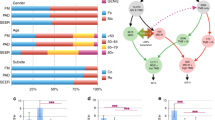Abstract
PURPOSE: The aim of this study was to elucidate pathways of carcinogenesis in the colon and rectum by investigating Ki-ras point mutation in different types of colorectal carcinomas in the early stage. METHODS: We analyzed rates of Ki-ras codon 12 mutations in 34 small, polypoid-type carcinomas (Tis or T1), 21 superficial-type carcinomas (Tis or T1), and 42 advanced carcinomas (T2, T3, and T4). RESULTS: Frequency of Ki-ras mutations in superficial-type carcinomas was 14.3 percent (3/21), which was significantly lower than 50 percent (17/34) in small polypoid carcinomas and 40.5 percent (17/42) in advanced carcinomas. These data suggest that another pathway of colorectal carcinogenesis that does not involve Ki-ras point mutation might exist. Among the 17 small polypoid carcinomas with Ki-ras point mutation in which both adenomatous and carcinomatous tissue were examined, 12 showed a mutation of the same type in both carcinomatous and adenomatous tissues. In two cases, mutation was present only in carcinomatous tissue and not in adenomatous tissue; in the other three cases, Ki-ras point mutation was present only in adenomatous tissue but not in carcinomatous tissue. CONCLUSIONS: These data suggest that carcinoma in a small polypoid lesion does not always develop from pre-existing adenoma with Ki-ras point mutation; in a small number of the polypoid-type early carcinomas, polyclonal composition concerning the Ki-ras gene may exist.
Similar content being viewed by others
References
Vogelstein B, Fearon ER, Hamilton SR,et al. Genetic alterations during colorectal-tumor development. N Engl J Med 1988;319:525–32.
Fearon ER, Vogelstein B. A genetic model for colorectal tumorigenesis. Cell 1990;61:759–67.
Kinzler WK, Nilbert MC, Vogelstein B,et al. Identification of a gene located at chromosome 5q21 that is mutated in colorectal cancers. Science 1991;251:1366–70.
Kinzler WK, Nilbert MC, Su L-K,et al. Identification of FAP locus genes from chromosome 5q21. Science 1991;253:661–5.
Nishisho I, Nakamura Y, Miyoshi Y,et al. Mutations of chromosome 5q21 genes in FAP and colorectal cancer patients. Science 1991;253:665–9.
Baker S, Fearon E, Nigro J,et al. Chromosome 17 deletions and p53 gene mutations in colorectal carcinomas. Science 1989;244:217–21.
Fearon ER, Cho KR, Nigro JM,et al. Identification of a chromosome 18q gene that is altered in colorectal cancers. Science 1990;247:49–56.
Bos JL, Fearon ER, Hamilton SR,et al. Prevalence ofras gene mutations in human colorectal cancers. Nature 1987;327:293–7.
Wolber RA, Owen DA. Flat adenoma of the colon. Hum Pathol 1991;22:70–4.
Laurent-Puig P, Olschwang S, Delattre O,et al. Association of Ki-ras mutation with differentiaton and tumorformation pathways in colorectal carcinoma. Int J Cancer 1991;49:220–3.
Forrester K, Almoguera C, Han K, Grizzle WE, Perucho M. Detection of high incidence of K-ras oncogenes during human colon tumorigenesis. Nature 1987;327:298–302.
Miyaki M, Seki M, Okamoto M,et al. Genetic changes and histological types in colorectal tumors from patients with familial adenomatous polyposis. Cancer Res 1990;50:7166–73.
Burmer GC, Loeb LA. Mutations in the KRAS2 oncogene during progressive stages of human colon carcinoma. Proc Natl Acad Sci U S A 1989;86:2403–7.
Ando M, Maruyama M, Oto M, Takemura K, Endo M, Yuasa Y. Higher frequency of point mutations in the c-K-ras 2 gene in human colorectal adenomas with severe atypia than in carcinomas. Jpn J Cancer Res 1991;82:245–9.
Adachi M, Muto T, Morioka Y, Ikenaga T, Hara M. Flat adenoma and flat mucosal carcinoma (IIb type)—a new precursor of colorectal carcinoma? Report of two cases. Dis Colon Rectum 1988;31:236–43.
Kuramoto S, Oohara T. Flat early cancers of the large intestine. Cancer 1989;64:950–5.
Herrera L, Hanna S, Castillo N, Petrelli NJ. Primaryde novo adenocarcinoma of the colon measuring 8 mm in diameter with lymph node metastases: report of a case. Dis Colon Rectum 1991;34:275–9.
Kudo S. Endoscopic mucosal resection of flat and depressed types of early colorectal cancer. Endoscopy 1993;25:455–61.
Matsumoto T, Iida M, Yao T, Fujishima M. Role of nonpolypoid neoplastic lesions in the pathogenesis of colorectal cancer. Dis Colon Rectum 1994;37:450–5.
Tada S, Yao T, Iida M, Koga H, Hizawa K, Fujishima M. A clinicopathologic study of small flat colorectal carcinoma. Cancer 1994;74:2430–5.
Kuramoto S, Oohara T. Minute cancers arisingde novo in the human large intestine. Cancer 1988;61:829–34.
Shimoda T, Ikegami M, Fujisaki J, Matsui T, Aizawa S, Ishikawa E. Early colorectal carcinoma with special reference to its developmentde novo. Cancer 1989;64:1138–46.
Hermanek P, Sobin LH, UICC. TNM classification of malignant tumors. 4th ed. Berlin: Springer-Verlag, 1987.
Yanagisawa A, Kato Y, Ohtake K,et al. c-ki-ras point mutations in ductectatic-type mucinous cystic neoplasms of the pancreas. Jpn J Cancer Res 1991;82:1057–60.
Soh K, Yanagisawa A, Hiratsuka H, Sugano H, Kato Y. Variation in K-ras codon 12 point mutation with histological atypia within individual colorectal tumors. Jpn J Cancer Res 1993;84:388–93.
Saiki RK, Scharf S, Faloona F,et al. Enzymatic amplification of beta-globin genomic sequences and restriction site analysis for diagnosis of sickle cell anemia. Science 1985;230:1350–4.
Verlaan-de Vries M, Bogaard ME, van den Elst H, van Boom JH, van der Eb AJ, Bos JL. A dot blot screening procedure for mutatedras oncogenes using synthetic oligodeoxynucleotides. Gene 1986;50:313–20.
Shibata D, Schaeffer J, Li Z-H, Capella G, Perucho M. Genetic heterogeneity of the c-K-ras locus in colorectal adenomas but not in adenocarcinoma. J Natl Cancer Inst 1993;85:1058–62.
Yamagata S, Muto T, Uchida Y,et al. Lower incidence of K-ras codon 12 mutation in flat colorectal adenomas than in polypoid adenoma. Jpn J Cancer Res 1994;85:147–51.
Author information
Authors and Affiliations
About this article
Cite this article
Kojima, M., Konishi, F., Tsukamoto, T. et al. Ki -ras point mutation in different types of colorectal carcinomas in early stages. Dis Colon Rectum 40, 161–167 (1997). https://doi.org/10.1007/BF02054981
Issue Date:
DOI: https://doi.org/10.1007/BF02054981




